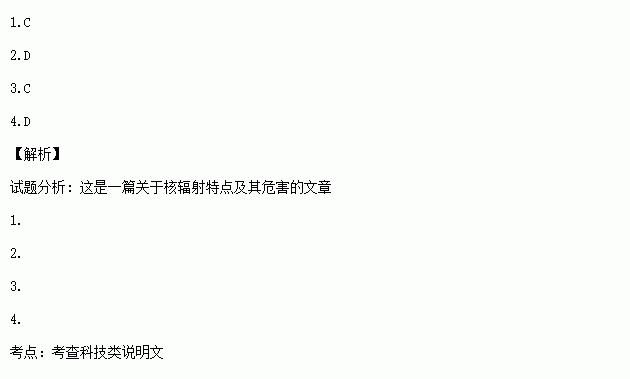题目内容
Nuclear power’s danger to health, safety, and even life itself can be summed up in one word: radiation.
Nuclear radiation has a certain mystery about it, partly because it cannot be detected by human senses. It can’t be seen or heard, or touched or tasted, even though it may be all around us. There are other things like that. For example, radio waves are all around us but we can’t detect them or sense them without a radio receiver. Similarly, we can’t sense radioactivity without a radiation detector. But unlike common radio waves, nuclear radiation is not harmless to human beings and other living things.
At very high levels, radiation can kill an animal or human being immediately by killing masses of cells in vital organs. But even the lowest levels can do serious damage. There is no level of radiation that is completely safe. If the radiation does not hit anything important, the damage may not be serious. This is the case when only a few cells are hit, and if they are killed immediately. Your body will replace the dead cells with healthy ones. But if the few cells are only damaged, and if they reproduce themselves, you may be in trouble. They can grow into cancer. Sometimes this does not show up for many years.
This is another reason for some of the mystery about nuclear radiation. Serious damage can be done without the victim being aware at the time that damage has occurred. A person can be irradiated(辐射)and feel fine, then die for cancer five, ten, or twenty years later as a result. Or a child can be born weak as a result of radiation absorbed by its parents.
Radiation can hurt us. We must know the truth.
1.What is the main idea of the passage?
A. How radiation kills a man.
B. How to detect nuclear radiation.
C. The mystery about nuclear radiation.
D. Serious harm caused by nuclear radiation.
2. Which statement about nuclear radiation is true?
A. It is just like common radio waves.
B. It can be harmless if its level is low.
C. It can be detected by human senses.
D. It can cause cancer to human beings.
3. How can nuclear radiation kill an animal?
A. By damaging its heart.
B. By stopping it breathing.
C. By killing many cells in key organs.
D. By destroying its brain.
4. If a man is hit by nuclear radiation, he may _______.
A. die of cancer after many years B. die immediately
C. have a child who may be born weak D. all of the above

